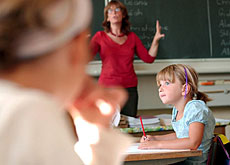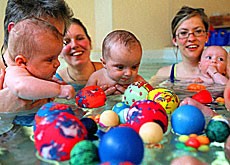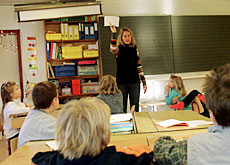New school year starts with fewer teachers

A new school year has begun in many parts of the country but it is being overshadowed by the decision by some cantons to reduce teaching staff.
The cantons, under pressure to cut their budget deficits, have also blamed declining enrolment at primary schools for the decision to lay off teachers.
This year’s layoff follows on the heels of a teacher shortage across the country.
According to Laurent Gaillard of the Federal Statistics Office, it was not long ago that there were so few trained teachers available that schools had to take drastic measures.
“They were forced to hire unqualified teachers and teachers from Germany,” Gaillard told swissinfo.
The tide has now changed. Teachers are being asked to pay the price for fiscal restraint and the fact that every year, as Switzerland’s birth rate continues to decline, there are simply fewer children to fill up the classes.
Redundancies
Canton Zurich has cut 211 teaching posts this year, affecting some 200 employees. The canton plans to scrap 350 teaching posts by 2007.
In neighbouring Aargau, 40 full-time positions have been done away with, affecting 143 members of the canton’s teaching staff.
Cuts to teachers’ hours are also part of the budgetary measures being taken in both Zurich and Aargau, which will be reflected in lower salaries.
Other cantons across the country, including Vaud, Graubünden and Neuchâtel, have also decided to reduce their education budgets, but this has not yet led to redundancies.
Basel-City is under pressure to cut SFr6 million ($4.8 million) by the start of school next year, which is the equivalent of 50 full-time jobs. The canton intends to make up for the shortfall through early retirements.
Canton Jura wants to save SFr13 million by 2007, and SFr950,000 this year alone. However, legal issues have for the meantime put the planned cuts on hold.
Teaching posts are not yet under threat in the southern canton of Ticino, where teachers are being asked to take on more classes.
Demographics
But declining school enrolment is also playing a decisive role in the changing face of primary education in Switzerland.
“The number of pupils entering school is directly related to demographic developments,” said Gaillard.
As the birth rate drops, so does the number of first grade pupils – despite new flows of immigrants entering the country each year.
In canton Bern, for example, there are 25 fewer school classes than there were one year ago.
“But no teachers were laid off because those affected were able to take over class workloads elsewhere,” says Robert Furrer of the canton’s education ministry.
Cantons Solothurn, Thurgau and Schaffhausen are also affected by declining enrolment. Thurgau will have to cut about 20 teaching posts over the next few years, as there will be 400 to 500 fewer children going to school there.
Class sharing
Because fewer teachers are needed in Graubünden, many places now have to bus their children to schools in neighbouring towns and villages. The canton is not planning on reducing its teaching force.
There are 13 primary school classes fewer in canton Neuchâtel this year than in 2003. At the secondary level, on the other hand, class sizes have been enlarged.
Many teachers do not believe that spending less on education and creating larger classes is a viable solution to the problems facing Swiss schools.
It will “lead to a marked drop in teacher performance, to the disadvantage of the students”, warns Marco Polli of the teacher’s association in canton Geneva.
The Geneva teachers believe the negative effects will become evident in four or five years’ time.
Teachers in western Switzerland are planning to hold a demonstration in September to protest against the cutbacks.
swissinfo, Renat Künzi and Olivier Pauchard
The Swiss birth rate is at a 25 year low – at 1.37 per woman.
Education in Switzerland is the responsibility of the cantons.
The overwhelming majority of schoolchildren attend government-funded, state schools.

In compliance with the JTI standards
More: SWI swissinfo.ch certified by the Journalism Trust Initiative



You can find an overview of ongoing debates with our journalists here. Please join us!
If you want to start a conversation about a topic raised in this article or want to report factual errors, email us at english@swissinfo.ch.